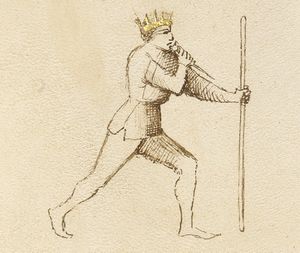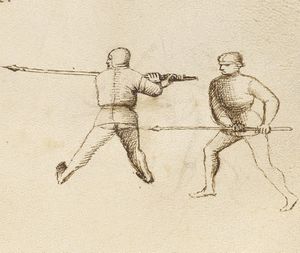|
|
You are not currently logged in. Are you accessing the unsecure (http) portal? Click here to switch to the secure portal. |
Difference between revisions of "Fiore de'i Liberi/Spear vs. Other Weapons"
| Line 108: | Line 108: | ||
<br/><br/><br/><br/><br/> | <br/><br/><br/><br/><br/> | ||
| − | Come one by one whoever wants to come, and I will run from no one. Again, I am positioned in the Boar's | + | Come one by one whoever wants to come, and I will run from no one. Again, I am positioned in the Boar's Tusk to wait, and when the lance will come against me (carried or thrown by hand) immediately I avoid its path, that is, I advance my right foot out of the way and with my left I step on the traverse, beating the lance that comes to strike me such that of a thousand, I couldn't fail to beat even one. This I do with the spear, and with the staff or with the sword I would also do it, and the defense that I make which is against the spear, I could also make against the sword or the staff. I ask that you view the plays that are hereafter. |
| | | | ||
<br/><br/><br/><br/><br/> | <br/><br/><br/><br/><br/> | ||
| Line 126: | Line 126: | ||
<br/><br/> | <br/><br/> | ||
| − | This play belongs to the Master who came before, who awaits him of the horse with his spear in Boar's | + | This play belongs to the Master who came before, who awaits him of the horse with his spear in Boar's Tusk. In stepping out of the way and beating as he does, he enters into this play and so that it is understood, I do according to his word and with the edge and the point I could strike him in the head, since I carry my spear with such readiness. |
| | | | ||
<br/><br/> | <br/><br/> | ||
Revision as of 01:38, 12 November 2013
Images |
Images |
PD |
Morgan Transcription [edit] |
Getty Transcription [edit] |
|||
|---|---|---|---|---|---|---|---|
[11] In this way I wait with the dagger and with the staff: This master waits for these two with their spears. The first wants to deliver the thrust over-hand, and the other wants to stab under-hand, as is seen. The master who waits with the stick and with the dagger; when one of these wants to attack with his spear, the master moves (piega=fold) the stick from (inverso=inverting) the right side that is almost in a Tutta di Porto Ferro (Full Iron Door), turning the body, not moving the feet nor the stick from the ground. And the Master remains in guard. And as one of these [attackers] strikes, he beats back (rebatter) the spear with the stick, and with the dagger in his left hand, if he must, and with that beat back (rebatter) he passes and injures. And this is his defence, as we will find after in these two spearmen. |
For this play, which is of staff and dagger against a lance, the Scholar awaits him of the lance in the Full Iron Gate (Tuta Porta di Ferro), turning his body but not moving his feet from the ground nor his staff toward the right side. And as he of the lance attacks the Scholar with his lance, the Scholar advances his left foot out of the way, beating and voiding the lance. And he steps close to him without delay and with the dagger he can strike him. This play he wants to make without fail. |
[18r-c] Ad aquesto partito si e de bastone, e daga contra lanza lo scolar aspeta quello da la lanza in tuta porta di ferro voltandose la persona, e non movendo gli pie di terra nel bastone inverso parte dritta. E come quello dal lanza tra al scolaro cum sua lanza. Lo scolaro acresce lo pe stancho fora de strada rebatendo, e schivando la lanza. E passa adosso de lui senza tarda, e cum la daga lo po ferire, questo zogo se vole fare a non falire. |
|
[15a-a] In tale forma cum la daga e cum el baston aspeto |
|||
|
[12] We were both ready to injure this master, but, according to what he said, we could do nothing. Except if we manage it in this way; that is, we turn (volteremo) our spear heads backwards, and stab with the butt (pedale=the rear of the shaft) of the spear. And when he beats back (rebatterà) the butt (pedale) of the spear, we will turn (volteremo) our spears and injure him on the other side with the spear heads. And this will be his contrario (counter). |
|||||||
[13] In that way that the previous Master has said, This is the play of the master who waits for those two with two spears. The master has in his right hand a dagger, and in the left holding the stick straight in front of him. He can do the play, and I do it for him in exchange. But if this player knew well how to do it, he could have avoided the dagger's point. If he had lifted the hands on the spear, and with the rest of the spear which remains behind he had covered under my dagger, that is crossed (incrosado), this would not have happened to him. And with his spear he could have wounded me, if he knew how to do this contrario (counter) to me. |
|
[15a-b] Per quello modo che lo magistro denançi a'deto |
|||||
[14] I wait here with two sticks and a dagger: This master will do a defence with these two sticks against the spear in this way: When the one with the spear is near enough to attack, the master, with his right hand, attacks with the stick at the head of the one with the spear. And immediately with this attack comes with the other stick covering at the spear, and with his dagger injures him in the chest, following what is drawn hereafter. |
|
[15a-c] Cum duii bastoni e una daga aqui t'aspeto |
|||||
[15] That which the Master has said, so do I do, I do what was said by the Master before. If you knew the contrario (counter), you would have caused me problems in this way: You have to lift your hands with your spear under my dagger, and in this way you could have stopped me wounding you. Have this, because you did not know what to do! |
|
[15a-d] Aquello che a'dito lo magistro aquello faço |
[8v-a] ¶ Hoc operor factis, quod nunc narrando magister | ||||
|
[16] |
Here are three companions who want to strike this Master: the first wants to strike underhand and carries his weapon at half-lance; the other carries his weapon in rest at full-lance; the third wants to throw his lance. And they are agreed that none should strike more than one blow per man, and that they should do it one by one. |
[8r-c] Aqui sono tri compagni che volemo ferire aquesto magistro lo primo vole ferire sotto man che porta sua lanza a meza lanza l'altro porta sua lanza a restada a tuta lanza, lo terzo lo vole alanza cum sua lanza E si a de patto che nesuno non debia fare piu de uno colpo per homo, anchora debano fare a uno a uno. |
|||||
[17] Even if Rolando and Pulicano were to make me an invitation with lances, |
Come one by one whoever wants to come, and I will run from no one. Again, I am positioned in the Boar's Tusk to wait, and when the lance will come against me (carried or thrown by hand) immediately I avoid its path, that is, I advance my right foot out of the way and with my left I step on the traverse, beating the lance that comes to strike me such that of a thousand, I couldn't fail to beat even one. This I do with the spear, and with the staff or with the sword I would also do it, and the defense that I make which is against the spear, I could also make against the sword or the staff. I ask that you view the plays that are hereafter. |
[8r-d] Vegna a uno a uno chi vole venire, che per nesun di qui non per partir. Anche in dente de zenghiar sono posto per aspetare, quando la lanza contra me vignira portada overo de man zitada, subito io schivo la strada zoe che io acresco lo pe dritto fuora de strada, e cum lo stancho passo ala traversa rebatendo la lanza che mi vene per ferir. Si che de mille una non poria falir. Aquesto io fazo cum la chiavarina cum bastone cum spada lo faria. E la defesa ch'io Fazo le contra le lanze contra spada contra bastone aquello faria li mie zoghi sono di dredo, guardagli ch'io ven prego. |
|
[34a-b] Si rolando e pulicano cum lanca me fesse invito |
|||
[18] I cut you in the head with my spear |
This play belongs to the Master who came before, who awaits him of the horse with his spear in Boar's Tusk. In stepping out of the way and beating as he does, he enters into this play and so that it is understood, I do according to his word and with the edge and the point I could strike him in the head, since I carry my spear with such readiness. |
[8v-a] Aquesto zogo si e delo magistro ch'e denançi che aspetta cum la chiavarina quisti da cavallo in dente de zenghiar. In pasar fora de strada e rebater ch'ello fa ello intra in questo zogo, e perch'ello sia inteso, io lo fazo in suo logo. Che cum taglio e punta lo posso ferir[9] in la testa. Tanto porto la mia chiavarina ben presta. |
|
[34a-c] Cum mia ghiavarina te tagio la testa |
|||
[19] With the butt I have struck you with my spear, |
Again is this the play of the aforesaid Master who was previously in the Stance of the Boar. In his stead I do this, which he also could have done: when the lance is beaten, I turn my spear and I strike him with the butt (since it is well-tempered iron). |
[8v-c] Anchora e aquesto zogo dello ditto magistro che denanci in posta de zenghiar in suo scambio io fazo aquesto ch'ello po fare, quando la lanza e rebatuda Io volto mia lanza e si lo fiero cum lo pedale. Che aquesto ferro si e temperado e de tuto azale. |
|
[34a-d] Cum lo pedalle t'o ferido dela ghiavarina |
- ↑ A tiny note (M, perhaps) may have been removed above “agitando”.
- ↑ Added later: "+ hoc ego".
- ↑ Added later: "nomen properum".
- ↑ Added later: "nomen properum".
- ↑ Added later: "de fresne".
- ↑ To the right, a multi-line note has been removed.
- ↑ Added later: "matreque?".
- ↑ There was a multi-word note here.
- ↑ "e" changed to "r".
- ↑ Black light reveals there used to be a note here. The thing that looks like : is all that remains.
- ↑ Added later: "reparer renouvelir".


